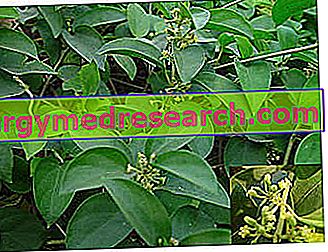Generality
Neurodegenerative diseases constitute a set of pathologies characterized by an irreversible and progressive loss of neuronal cells in certain areas of the brain.

However, it is believed that in the development of neurodegenerative diseases there is the involvement of several factors, which contribute to each other in giving rise to the pathology. Among these factors certainly stand out those of genetic and hereditary origin, and those of an environmental nature.
Neurodegenerative diseases can manifest themselves in different ways, depending on the area of the brain affected by neuronal loss and according to the type of neurons that are affected.
However, generally, all these pathologies have three points in common:
- Insidious and insidious onset, since in most cases the onset of the disease is asymptomatic and the symptoms only appear later, when the neuronal damage is quite extensive;
- Irreversible progression, since, unfortunately, there are still no cures able to permanently stop neurodegenerative diseases;
- Purely symptomatic treatment.
Among the most known neurodegenerative diseases, we recall:
- Parkinson's disease;
- Alzheimer's disease;
- Amyotrophic lateral sclerosis;
- Huntington's Korea;
- Dementias.
The main characteristics of the aforementioned diseases will be briefly described below.
Parkinson's disease
Parkinson's disease is one of the best known neurodegenerative diseases.
This pathology is characterized by the degeneration of neurons located in the substantia nigra (black substance) of the brain. More in detail, this degeneration results in impaired movement capacity, giving rise to symptoms such as:
- Tremor at rest;
- bradykinesia;
- Postural balance alteration;
- Muscle stiffness.
A deficiency of the dopamine neurotransmitter is found in patients with Parkinson's disease; for this reason, among the active ingredients most used in the treatment of this neurodegenerative disease, there are:
- Dopamine precursors, such as levodopa;
- Dopaminergic agonists, such as pramipexole;
- Monoamine oxidase inhibitors, such as selegiline;
- Catechol-O-methyl transferase inhibitors, such as entacapone and tolcapone.
Alzheimer's disease
Alzheimer's disease is another of the best known neurodegenerative diseases.
It is characterized by the abnormal accumulation of proteins, such as β-amyloid, which forms plaque in the brain, and the tau protein, which causes the formation of neurofibrillary aggregates.
The neuronal loss that characterizes Alzheimer's causes serious alterations in cognitive function and, in particular, affects short-term memory, learning ability and the patient's emotional sphere.
The main drugs used in the treatment of Alzheimer's disease are:
- Acetylcholinesterase inhibitors, such as donepezil and rivastigmine;
- Memantine (a non-competitive antagonist for the glutamate receptor, a neurotransmitter believed to be involved in the neuronal damage that characterizes Alzheimer's disease);
- Vitamins with antioxidant action (such as vitamin E), which can be effective in counteracting the oxidative stress that is generated at the neuronal level in Alzheimer's patients.
Amyotrophic lateral sclerosis
Amyotrophic lateral sclerosis (also known as "ALS") is a neurodegenerative disease that affects the motor neurons of the central nervous system.
These neurons control the muscles; therefore, their damage can seriously compromise all movements (including breathing), giving rise to symptoms such as: difficulty walking, difficulty swallowing, difficulty with speech, dyspnea and shortness of breath, up to respiratory failure.
Currently, the only active ingredient approved for the treatment of ALS is riluzole. This drug works by reducing the release of glutamate in the brain and spinal cord. Indeed, it is believed that this particular neurotransmitter may be involved in the degeneration of motor neurons that characterizes this type of neurodegenerative disease.
Huntington's Korea
Huntington's chorea is a hereditary neurodegenerative disease.
The disease in question arises due to the transmission of a mutated gene that encodes the huntingtin protein (or HTT). Therefore, the protein encoded by this gene is mutated and - even if the mechanisms by which this occurs are not known exactly - it seems to be responsible for the degeneration of the neurons of the caudate nucleus that characterizes this disease.
Cognitive and motor skills are severely impaired in patients with Huntington's disease. This impairment leads to symptoms such as mood swings, memory loss, depression, difficulty in walking, speech and swallowing.
Among the different drugs used in the symptomatic treatment of this neurodegenerative disease, we mention: anti-Parkinson drugs, antipsychotics and antidepressants.
dementias
Dementias are a group of typical neurodegenerative diseases - but not exclusive - of old age. In this type of pathology, the patient undergoes neuronal damage, which leads to a decline in cognitive functions.
There are different types of dementia and Alzheimer's disease is one of them. Among the most widespread forms of dementia, we recall:
- Frontotemporal dementia;
- Dementia with Lewy bodies;
- Vascular dementia.
The symptomatology of dementia varies according to the area of the brain in which neuronal damage occurs, therefore, it depends on the type of dementia that has affected the patient. Similarly, the type of treatment (however symptomatic) will depend on the form of dementia the patient suffers from.



